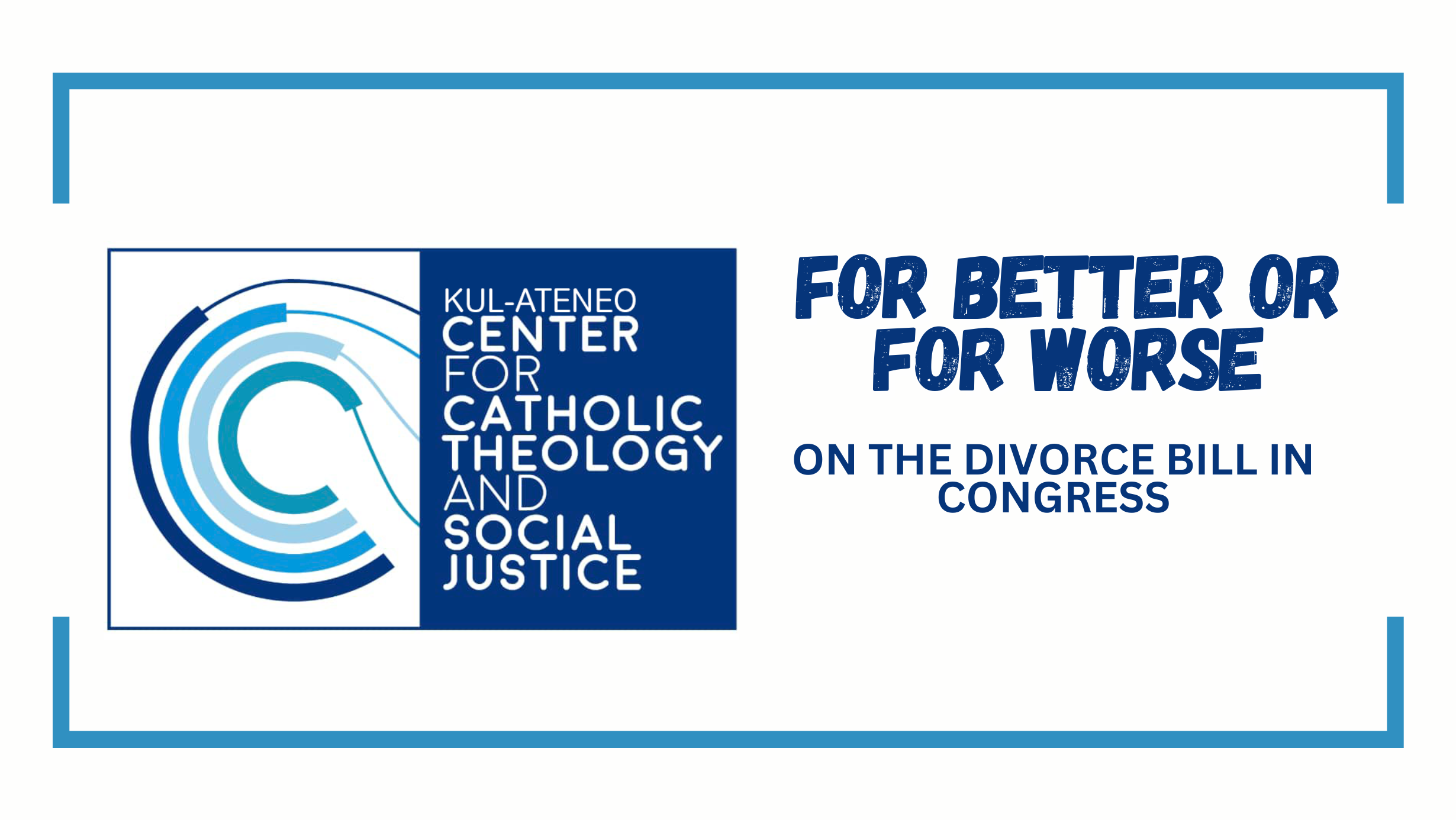6. Jun 2024 – In the midst of the ongoing debates about the Absolute Divorce Bill in Congress, we offer you the statement of the KUL-ADMU Center for Catholic Theology and Social Justice about it. (The first sentence was edited for the sake of clarity and precision.)
——————
The Absolute Divorce Bill is a public policy issue, not a religious one. Having no divorce law in our country does not mean that we are already upholding and promoting the sanctity of marriage. At the same time, supporting and having a divorce law does not necessarily mean we are endangering the institution of marriage. While not ideal, divorce as contemplated by the authors of the bill is only for irreparable marriages. Catholics who are in healthy marriages and are against it are not compelled to get one.
In reaction to the House of Representatives’ recent approval of the bill in its final reading, many church people not surprisingly voiced their strong opposition to it. While the church rightly emphasizes its teachings on marriage and the family, it must not lose sight of the reality of the struggles that married couples and families experience in their daily lives. We ought not speak of the sacramentality of marriage merely in the abstract but must seriously grapple with its lived reality. “The indissolubility of marriage – ‘what God has joined together, let no man put asunder’ (Mt 19:6) should not be viewed as a ‘yoke’ imposed on humanity, but as a ‘gift’ granted to those who are joined in marriage… God’s indulgent love always accompanies our human journey” (Amoris Laetitia 62).
The church’s teachings about the sacrament of marriage and the family as the domestic church present the ideal. However, the experiences of many married couples and families are different and far from it to the extent that there is a perceived need for divorce in our country. We need to recognize that there is no perfect marriage but that there are successful, meaningful and fruitful ones because of God’s grace and the persevering efforts of married couples to make their relationship work. We also need to acknowledge that there are married couples who ought not to have gotten married in the first place. There are individuals who are incapable of any genuine commitment. There are even those who have shown themselves to be abusive of both their spouses and children. Sadly, many of those victims of physical, emotional or sexual abuse continue to suffer. They even feel that they need to sacrifice their own happiness for the sake of their children. Abusive marriages are not sacramental at all and they should make us question if it is truly God who has joined them together. Many women in such difficult marriages find themselves financially and socially vulnerable, and lacking in legal support. Our church leaders need to listen to their heartbreaking stories, “avoid judgements that do not take into account the complexity of various situations,… be attentive, by necessity, to how people experience and endure distress because of their condition,”
and learn from them (Amoris Laetitia 79).
Many of our parishes do not have adequate safeguards that prevent those who are psychologically unprepared and incapable from getting married. They also do not have adequate marriage preparation and ongoing programs that empower married couples to grow as a couple in the various stages of their married life. In most instances, married couples are left to their own devices to figure out the meaning of their marital commitment and grow together in grace. In addition, most parishes lack the initiative to go out of their comfort zones and to the peripheries, smell like the sheep, and develop creative programs that are truly responsive to the concerns of the married people. “The Synod Fathers noted that ‘special discernment’ is indispensable for the pastoral care of those who are separated, divorced or abandoned. Respect needs to be shown especially for the sufferings of those who have unjustly endured separation, divorce or abandonment, or those who have been forced by maltreatment from a husband or a wife to interrupt their life together” (Amoris Laetitia 242).
The Absolute Divorce Bill in Congress ought to make the church be more reflexive of our own shortcomings. As Pope Francis rightly asserts, “We need a healthy dose of self-criticism” (Amoris Laetitia 36). It is not enough that our pastors preach about the sanctity of marriage and resist the impending enactment of the bill into law. We also need to develop comprehensive programs that sufficiently prepare those who receive the sacrament and that provide them the necessary support to grow in their married and family life. At the same time, the church as a community should offer its pastoral support to those who are abused by their spouses or are struggling in their marriages, accompany them in their need, and with them, discern what God desires for them and to where God is leading them in their lives. After all, the church is “called to form consciences, not to replace them” (Amoris Laetitia 37). It is only when the church has adequate programs in place, showing “compassion and closeness to the frailty of individuals” (Amoris Laetitia 38), that it can more credibly preach about the sacrament.
Our role as a community for the success of any marriage is indispensable. When we do our part, marriage can truthfully be a commitment for better and for worse. Divorce ought to be only a last resort but we must not stand in the way of those who truly need it.
